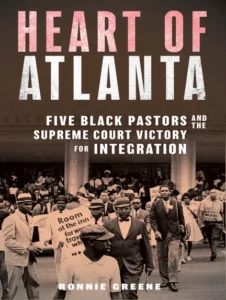 Summary: A journalistic account of two Atlanta legal cases in response to the 1964 Civil Rights act, joined by the Supreme Court to uphold public accommodations (Title 2 of the 1964 Civil Rights Act).
Summary: A journalistic account of two Atlanta legal cases in response to the 1964 Civil Rights act, joined by the Supreme Court to uphold public accommodations (Title 2 of the 1964 Civil Rights Act).
I do not think I would have picked up Heart of Atlanta if my book club had not decided to go to a book talk with the author at the Atlanta History Center. But Heart of Atlanta is the type of narrow history that I think is exactly what we often miss in our too-quick presentation of the Civil Rights Era. The Civil Rights Era was so transformational because the movement was broad-based. Literally, hundreds of thousands of people participated, at least in minor roles. But even the often significant characters of the era have been forgotten. And the more minor characters were often never really known. One of the best examples of this is that frequently throughout the book, Ronnie Greene will cite a video or picture or newspaper story about these events, and the five main characters of the story were either unnamed or listed as “unknown.” In fact, the men often did not know that there was photographic or video documentation of their protests until Ronnie Greene showed it to them.
All five pastors in the subtitle were students at the Interdenominational Theological Center seminaries (ITC). Two of the five pastors are still living, Albert Sampson (involved in the earlier sit-in movement in North Carolina) and Woodrow Lewis (involved in the earlier Atlanta Student Protest movement). Unfortunately, the other three, Albert Dunn (also involved in the Freedom Rides), Charles Well, and George Willis (both having been in the military before returning to attend college and seminary), have passed away. All five continued their activism after their involvement in these cases, but like many pastors organizing in their communities, they did not obtain national recognition.
The manager and part-owner of the Heart of Atlanta Hotel, Moreton Rolleston, was a lawyer. He filed suit against the Civil Rights Act of 1964 the day it went into effect. His suit was a barrage of arguments, that Congress didn’t have the right to regulate local businesses, that the 14th amendment did not prohibit individual discrimination, that the 13th amendment prohibited slavery and this regulation was a type of enslavement, that the regulation was a type of seizure and therefore a violation of his fifth amendment rights.
The five pastors attempted to eat at Lester Maddox‘s Pickrick Restaurant. Maddox took out a weekly ad in the local paper to promote the restaurant and rail against integration, and promote his brand of segregation. After the Civil Rights Act of 1964, a rotating group of the five pastoral students attempted to eat at the restaurant. They were turned away, at times with guns pointed at them, and threatened with a beating by the ax handles that Maddox sold to customers for the purpose. Civil rights lawyer Constance Baker Motley took up the case and quickly filed suit against Maddox and the restaurant. The two cases were heard by a federal court panel together and were very quickly combined into a Supreme Court Case, Heart of Atlanta Motel vs. the United States. (Baker Motley, just two years later, was the first Black woman appointed as a judge in the federal court system.)
The Civil Rights Act of 1964 was signed on July 2, 1964. The Supreme Court heard oral arguments on Oct 5 and released the decision on Dec 14. The decision was unanimous with two concurring opinions, but it is a case that most do not know about. The court upheld Congress’s authority to use the Commerce Clause to regulate local businesses and dismissed the idea that the 13th or 5th amendment could be used to prevent regulation.
I appreciated the book talk and hearing the author present an overview and respond to questions. Greene is a journalist, and I think this reads like it was written by a journalist and not a lawyer or academic historian. That is not meant to be negative, but a lawyer likely would have spent more time on the legal case and less on the context of the case. And a historian likely would have written with a different tone and contextualized the story differently. This isn’t quite right, but this feels like it was written as a thriller. Greene keeps building tension and then moving back to the context before moving on with the story. It felt a lot like the biography of Robert Smalls that I recently read, which was written by Cate Lineberry, also with a journalistic background.
One of the points that I think came out in the book well was that despite the very different backgrounds of Maddox and Rolleston, they both were driven not just by personal racism but by a libertarian understanding of government that believed that the government had no right to regulate private businesses. Kevin Kruse’s main thesis of White Flight, also about Atlanta, was that the libertarian wing of the GOP was empowered by the rise of integration and attempted to create more private spaces to minimize the reach of government regulations toward integration. But that libertarian impulse was clearly already present in 1964, not just in 1984.
Heart of Atlanta: Five Black Pastors and the Supreme Court Victory for Integration by Ronnie Greene Purchase Links: Hardcover, Kindle Edition, Audible.com Audiobook